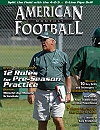Article CategoriesAFM Magazine
|
Trojan Force – Head Coach Allan Trimble has built the Jenks High School program into a perennial power in Oklahoma and overcome adversity along the wayby: Lynn Jacobsen© More from this issue Allan Trimble, the Head Coach at Jenks High School (OK), authored the book ‘Coaching Football Successfully’ in 2001. In it, Trimble wrote that success should not be measured solely in terms of wins and losses. “Success comes in many shapes and sizes,” said Trimble. “It could be mentoring an athlete who is facing adversity, having your team show improvement as the season progresses, or having both a loyal and supportive coaching staff.” • Trimble clearly has been successful. He was named head coach at Jenks in the spring of 1996. In the fifteen years since, Trimble has taken the Jenks 6-A program – the state’s largest classification – to the championship game 13 times. In the process, his teams have won nine state titles, an average of 12 wins a season and compiled an overall record of 186-18....The full article can only be seen by subscribers.
|
|
|||||||
| HOME |
MAGAZINE |
SUBSCRIBE | ONLINE COLUMNISTS | COACHING VIDEOS |
Copyright 2025, AmericanFootballMonthly.com
All Rights Reserved





